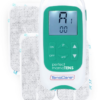Incontinence Explained (2023)

Incontinence Explained
Incontinence is a widespread condition that affects 8.7% of individuals above 20 years old worldwide, which increases up to 30 to 60% in women aged 40 and over. Incontinence ranges in severity from ‘just a small or occasional leak’ to the complete loss of bladder or bowel control. It can occur at any age, but it is more likely to develop as you get older or following childbirth. Some people wrongly think that incontinence is a normal part of ageing or that it cannot be treated. This is unfortunate, as many cases can be successfully treated or at the very least be significantly improved. Urinary incontinence often occurs because of weak or stretched pelvic floor muscles. These muscles assist in supporting the abdominal and pelvic organs; help to control the bladder and bowel; provide support for the baby during pregnancy and assist in the birthing process; as well as working with the abdominal and back muscles to stabilize and support the spine. In men, they are also important for erectile function and ejaculation. (Yes, men have a pelvic floor too!)
Urinary incontinence can often be improved and can in most cases be treated. Urinary incontinence is treated differently according to the type and cause. Pelvic floor exercises are seen as the most effective way to prevent issues with incontinence, especially stress incontinence. Yet, 1 in 3 women who are trying to perform pelvic floor exercises, do not know how or are unable to voluntarily exercise their pelvic floor muscle themselves and require assistance.
Incontinence is commonly associated with:
- Accidentally leaking urine when you exercise, laugh, cough or sneeze
- Needing to get to the toilet in a hurry or not making it there in time
- Constantly needing to go to the toilet
- Finding it difficult to empty your bladder or bowel
- Accidentally losing control of your bladder or bowel
- Accidentally passing wind
- A prolapse – In women, this may be felt as a bulge in the vagina or a feeling of heaviness and discomfort
- A prolapse – In men, this may be felt as a bulge in the rectum or a feeling of needing to use their bowels but not actually needing to go
- Finally, if pain is experienced in your pelvic area during or after sex
There are different types of incontinence with several possible causes. The following are the most common:
Stress incontinence – occurs during activities that increase abdominal pressure such as coughing, sneezing, laughing, lifting heavy objects or during physical activity. It is the most common form of urinary incontinence and affects about 51% of women suffering from incontinence.
Urge incontinence – occurs when the need to urinate comes on so quickly that you might fail to make it to the bathroom in time. Also known as an overactive bladder. This is the most common form of urinary incontinence in men, affecting between 40-80% of men above 20 years old, worldwide. It can affect anyone at any age, but it appears to be more prevalent in the elderly.
Mixed incontinence – a combination of both stress and urge incontinence. If you or anyone you know experience the symptoms of incontinence it is important to know that there are safe, effective, and drug-free solutions that can assist in the long-term management of the condition. Let’s normalize the conversation around the condition.
Incontinence and the affect it can have on your Mental Health.
Mental health and incontinence are both hard to talk about, but due to the number of people suffering with the condition we need to lift the lid on this subject and normalize the conversation. What many people do not realize is that the two can be interlinked. In fact, 30% of women with incontinence will also suffer from depression, which is three times more likely than the general population. Another study found that 28% of overactive bladder patients also experience depression, with half of these suffering from moderate to severe depression.
Having a problem with your bladder can massively affect your self-confidence and have an impact on many areas of your life including your mental health. It is important to remember that you are not alone, and there are products and solutions that can help you.
Dr John S. Young, Associate Professor in Urology, spoke about the connection between mental health and incontinence in a recent interview, where he delved into the connections between the two conditions.
How can incontinence affect mental health?
Many studies clearly demonstrate that incontinence has a significant negative impact on mental health. There are a variety of ways that incontinence can impact every aspect of life.
- emotional – fear of incontinence in public as well as feeling and becoming socially withdrawn
- relationships – fear of intimacy
- stopping exercise – for fear of incontinence
- employment – feeling stigmatized, reduced self-confidence and self-worth leading to periods of absence from the workplace
- quality and length of sleep
What symptoms of mental changes should I look out for?
Incontinence is still a taboo subject for many, but if you know someone who is suffering or you are suffering with the condition yourself, then it is a case of looking out for signs of mental illness which will usually present themselves as depression. These signs may include:
- withdrawal – not going out anymore and cancelling plans (sometimes at the last minute)
- changes in mood – including both irritability or frustration and seeming sad
- expressing dark thoughts
- changes in eating habits
- increased consumption of alcohol
How can mental health issues increase incontinence?
There can be cases where mental health concerns can directly cause or increase incontinence, as Dr. John explains: “Mental illness can be associated with lifestyle factors that affect the bladder, such as the consumption of substances (caffeine, alcohol) that affect bladder function, and fluctuating fluid intake (excessive one day and insufficient intake the next day).”
“A person suffering with pathological anxiety may develop obsessive habits that lead to more frequent voiding, a heightened awareness of bladder fullness and a type of incontinence associated with this, called urge incontinence. By contrast, incontinence can occur because a person becomes less aware of bladder fullness; that is, detached from the sensations that tell us when we need to empty our bladder.”
What should you do if someone you care about is experiencing mental health issues due to their incontinence?
If your friend or family member seems to be suffering from incontinence and mental health issues, the first thing to do is talk to them and let them know they are not alone. It may be a good idea to encourage them to talk to a trained professional or seek assistance through support groups or from their GP.
Incontinence is an increasing problem that affects women and men of all ages. It is important to keep the channels of communication open and normalize the conversation. TensCare offers a range of products that assist in training the pelvic floor muscles aiding with the long-term management of incontinence. Explore the range today and see how TensCare can help you feel better naturally.





